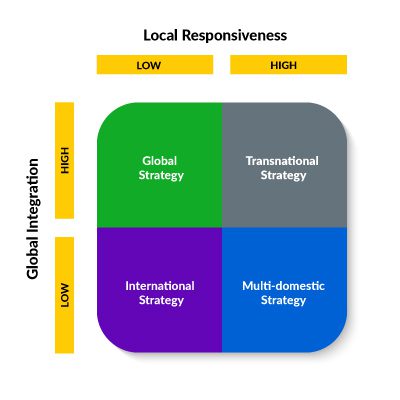What is International Marketing?
International marketing involves producing, distributing, promoting, and selling products into foreign markets by establishing a direct relationship with local markets. Many international marketing strategies require opening in-country subsidiaries, branches, and offices to execute localized marketing efforts effectively.
New market expansion can succeed in most industries and is used frequently em international e-commerce, travel, manufacturing, and technology. There are several reasons for international expansion, but business growth tops the list. According to Statista, global retail sales are projected to reach 32.8 trillion dollars by 2026. Companies that are willing to try international expansion can expect increased revenue, stronger brand recognition, and a larger customer base.
How to Create an International Marketing Strategy
An international marketing strategy supports business expansion into global markets. Creating an international marketing strategy takes a solid foundation of research, knowledge, and a clear vision.
Start with Market Research
Understanding how your target customers shop or consume content online can help you improve website usability and provide a better customer experience. Online market research can help you identify each point of a customer's buying journey. Market research is essential for understanding the target demographics, market conditions, and competition.
- Keyword Research: Tools like Google Trends and KWFinder provide insights into market demand by country. Identifying high-traffic keywords can reveal potential opportunities.
- Consumer Surveys: Platforms like SurveyMonkey help businesses gather feedback from specific international audiences.
- Government Resources: Websites like Trade.gov offer insights into foreign markets, regulations, and financing options for international projects.
Define Your Target Audience
Adapting your global marketing strategy for international audiences is essential. Before you can begin implementing any strategy in the international markets of choice, you must first understand to whom you are marketing. You can not assume that your current buyer persona will translate directly into foreign markets. A CSA Research survey found that 76% of global consumers prefer purchasing products in their native language, and 40% will never buy from sites in other languages. To successfully market your product or service, tailor your international marketing efforts to specifically reach the population segment that will most likely buy your product or service.
Establish A Global Expansion Structure
After researching and pinpointing which markets your product or service will create profitability and who your target audience is, the next step is to determine how you'll present your product and service to the market. What's the most effective way to market and deliver your product/services to these target audiences? Different methods of international expansion include exporting, licensing, joint ventures, and franchising, among others.

Companies can decrease the risk of entering a foreign market by forming partnerships with other companies. These companies should also have an interest in selling in that market. Joint ventures can earn more money than individual companies because they work like big independent companies, not just two small ones.
Companies need to understand what strategy is more likely to succeed by inferring the degree of local responsiveness and global integration necessary for new and sustained growth. Multi-domestic and transnational strategies are well suited for international marketing plans.
Key Considerations of International Marketing
International marketing considers more than just language – it involves culture, international law, market saturation, and customer behaviors.
Language and Cultural Adaptation
Cultural adaptation is crucial when marketing to foreign audiences. Studies indicate that 73% of consumers prefer product reviews in their language, even if other website content remains in English. To successfully localize content, businesses must balance standardization (e.g., consistent brand messaging) with customization (e.g., culturally relevant campaigns).
You will need to find a balance between standardizing translated content, like always translating a product name the same way, and customizing content, like, localizing different content pieces and campaigns uniquely for different markets.
Website localization can help you go beyond converting copy from one language to another. O processo de localização de websites takes account of local cultural sensitivities, contains cultural references that will speak to the target audience, has the right tone, and doesn’t use idioms or phrases that won’t translate well.
Government Regulations and Compliance
Navigating international laws and regulations is a key aspect of global expansion. Businesses must comply with:
- Taxation and Tariffs
- Employment and Labor Laws
- Data Protection Regulations (e.g., GDPR in Europe)
- Product Standards and Certifications
Failing to meet regulatory requirements can lead to fines or business restrictions. Researching compliance guidelines before entering new markets is essential.
Efficient Coordination and Execution
Global expansion requires a seamless localization strategy. Instead of relying on in-house teams for translations, companies can benefit from outsourced translation and localization services.
When expanding globally, local subsidiaries and office employees might need to do more than just their job. Whatever you do, don't make your local Sales reps pretend they’re linguists and translate content. Decide what you can take on internally and what you should outsource.
Outsourcing tradução de websites can be a fast and cost-efficient path to increasing your reach without burdening your existing team.
Professional translation partners provide:
- Website Localization: Adapting text, images, and layout for local audiences.
- Multilingual SEO: Optimizing content to rank in region-specific search engines.
- Automated Translation Solutions: Using AI-powered tools to scale content across markets.
Outsourcing the translation and localization of your website to an experienced partner can streamline the effort and expense of translating, deploying, and operating multilingual websites.
What are the Benefits of International Marketing?
International Market Expansion
Expanding internationally opens your business to new markets and sales opportunities while learning about global audiences, preferences, and business expansion. In addition, international marketing can significantly open up a large customer base and sales opportunities. Today, customers can buy from across the world via the internet, making market expansion through international marketing a valuable skill for businesses to understand and employ.
Strengthening Global Brand Recognition
Entering new markets before competitors allows businesses to establish brand dominance. Companies that expand early accumulate insights, customer data, and local market expertise that strengthen their long-term presence.
Doing business internationally can improve a company's reputation and make it more recognizable. This can be helpful for things like negotiating contracts, launching new marketing campaigns, or expanding further in the future.
Builds Brand Trust and Reputation
With an international marketing strategy, new market expansion can build your brand's image with local communities and support your reputation. The more people see your marketing (in their language), the more they find your website, ask for info, and buy; leading to higher conversion rates. Customers perceive brands selling in multiple markets as higher quality and offering better service than local-only brands.
Let MotionPoint Support Your International Marketing Goals
Developing a dynamic international marketing strategy requires expertise in localization, SEO, and global expansion. Understanding the demands and expectations of the challenges and benefits of expansion in foreign markets is essential. The key to maximizing marketing efforts is ensuring that your content and materials are personalized, localized, and seamlessly delivered to targeted audiences wherever they reside.
MotionPoint is a empresa de tradução e localização with experience in localization and website translation that have experts that can offer consultation to your particular business sector. You can trust the expertise of an agency like MotionPoint to provide multilingual localization, perfectly on point for worry-free expansion wherever your business takes you.
For a limited time, you can save up to $10,000 on your initial website translation and localization project! This exclusive offer comes with no set up fees, no initial conversion fees, and no code. You can expand to new global markets while saving thousands. Don’t miss out on this deal.
Última atualização: 02 de abril de 2025

